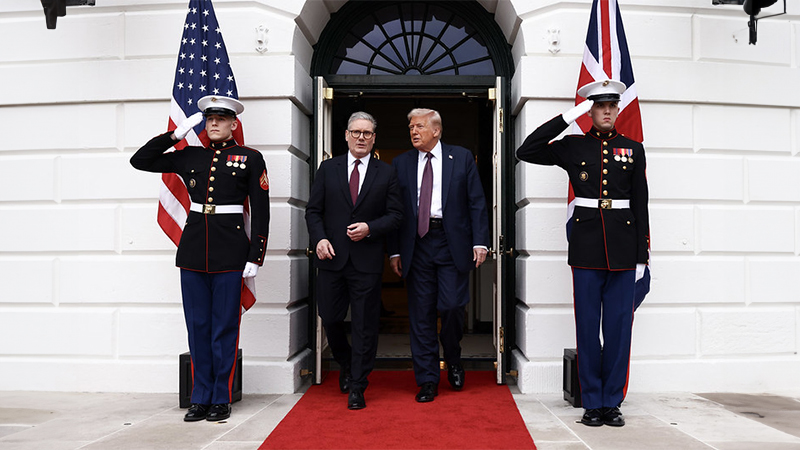Trump’s ‘Liberation Day’ tariffs announcement last night has sent markets tumbling as investors grapple with the fallout.
At the time of writing (11:15am), E-mini S&P 500 Index Futures were down 3.3% since 5am GMT. The FTSE 100 was down 1.5% since the start of trading, while Europe’s STOXX 600 dropped 1.7%.
Reacting to the announcement, Daniel Murray, deputy CIO & global head of research at EFG, said: “The road to hell is famously paved with good intentions. The wide-ranging tariffs announced by the US administration overnight should be viewed in this context.
“Tariffs were applied to a broader range of countries, including historic US allies, and at higher rates than had been expected. The good intent in this instance relies on the assumption that tariffs will raise government revenues – thereby reducing the size of the budget deficit and potentially allowing room for tax cuts elsewhere – whilst at the same time encouraging more domestic investment and production.
“While these might be worthy aims, history strongly suggests that such a naïve approach to trade policy does not end well.”
See also: Trump places tariffs on all global trading partners, including 10% on UK
Murray added that the risk of a US and global recession has increased directly as a result of the tariffs, while the likelihood that inflation stays higher for longer has also increased.
“In turn, the possibility of stagflation makes life very difficult for central banks. Immediately following the tariff announcement, Treasuries rallied as part of the risk-off trade. However, the medium term path for Treasuries is far more uncertain due to the upward pressure on prices that is expected to follow tariff implementation.
“As was seen in 2022 and 2023, when faced with a choice between fighting inflation and supporting the economy, central bankers place greater weight on the former, at least in the short term, for fear that if inflation becomes embedded the longer term consequences are even more painful.”
UK to be least affected?
The UK seemingly got off lightly compared to other countries, with Trump imposing the lowest baseline tariff of 10%.
Imports from nations such as Saint Pierre and Miquelon, Cambodia and Laos were hit with tariffs as high as 50%, 49% and 48% respectively, while the European Union had 20% imposed on them.
Tomasz Wieladek, chief European economist at T. Rowe Price, said the UK will be the “least affected” by the new policies.
“I believe the overall negative effect on the UK economy will only be about 0.2-0.5% this year. This is mainly because trade diversion to the US via the UK is likely to be now significant. Plants producing anything in the UK will be more competitive than in the EU, which will support some domestic investment.
“The UK is a trade deficit country, and President Trump has just created significant excess capacity across the world. UK households will now benefit from much cheaper goods, raising disposable income. Most importantly, the UK government implemented a large fiscal stimulus package six months ago, just in time to absorb the tariff hit.
“Despite the headwinds, the UK will do better in 2025 than the EU. A mild recession in the euro area in 2025 is now probable. The ECB will cut rates below the neutral rate to 1-1.5%.”
See also: Alpha FMC: Regulation, AI and private markets to shape asset & wealth management growth
Simon Edelsten, CIO of Goshawk Asset Management said that its hard to tell exactly what the knock-on effects of ‘Liberation Day’ will be, beyond “depressing for markets and people”.
“The details are still vague; the maths behind it unfathomable. On the face of it the UK has got off lightly, but cars made in the UK will probably be sold into Europe rather than the USA. The next largest UK export to the US is pharmaceuticals.
“No-one is sure from Trump’s ramble whether the tariffs cover all pharmaceuticals. A US citizen taking a drug made by, say, Glaxo, is unlikely to switch to a cheaper medication, so will just have to pay the higher price.
“Countries facing much higher tariffs will look to sell goods once intended for the US to other markets, including the UK. While this can make things cheap for consumers here, it may also undermine the profitability of domestic manufacturers.”
He added: “For UK investors, ‘tin hat’ stocks such as property shares and insurance companies have the resilience to cope with these changes. Economically sensitive sectors such as banks and commodity stocks may not cope so well.
“After the Spring Statement many commentators noted how little ‘wriggle room’ the UK Chancellor has in her budget. The UK tariffs are lower which is good, also gilt yields have fallen – which makes UK debt interest lower, which is good but also reflects lower growth prospects which is bad!
“Overall, for businesses and for chancellors and US consumers there is nothing good (or even coherent) about these tariffs.”









